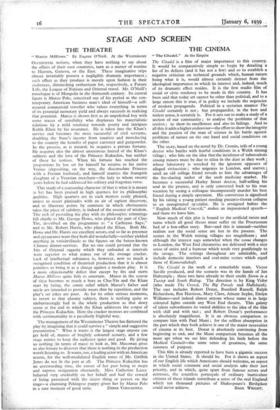THE CINEMA
" The Citadel." At the Empire
The Citadel is a film of major importance to this country. It would be comparatively simple to begin by detailing a list of its defects (and it has not a few) and so to establish a negative criticism on technical grounds which, human nature being what it is, would almost certainly detract from the ideological importance in which its interest and, indeed, much of its dramatic effect resides. It is the first studio film of social or civic tendency to be made in this country. It has been said that today art cannot be other than political, and to a large extent this is true, if in policy we include the urgencies of modern propaganda. Political in a sectarian manner The Citadel certainly is not ; but propagandist, in the best and widest sense, it certainly is. For it sets out to make a study of a section of our community ; to analyse the problems of that section ; to show its excellences and also its failings. And to all this it adds a higher endeavour—the effort to show the integrity and the passion of the man of science in his battle against problems of nature on the one hand and social conditions on the other.
The story, based on the novel by Dr. Cronin, tells of a young doctor who battles with fearful conditions in a Welsh mining village ; who hits on the idea that the incidence of tuberculosis among miners must be due to silica in the dust as they work ; whose laboratory is wrecked by the ignorant opposers of alleged vivisection ; who migrates to London, and starves; until an old college friend reveals to him the advantages of the fee-sharing racket of the snob medicine market. He becomes a successful Harley Street doctor, half-selling his soul in the process, and is only converted back to his true vocation by seeing a colleague incompetently murder his best friend during a simple operation. His conversion is signalised by his taking a young patient needing pneumo-thorax collapse to an unregistered specialist. He is arraigned before the " English Medical Council," makes an impassioned speech— and there we leave him.
Now much of this plot is bound to the artificial twists and turns which all good theses must suffer on the Procrustean bed of a box-office story. But—and this is unusual—neither realism nor the social sense are lost in the process. The scenes in the Welsh mining villages are magnificent ; and although the interest sags somewhat when the venue changes to London, the West End chicaneries are delivered with a nice sense of satire and a humour which tends very gratifyingly to the savage. The settings throughout are admirable, and include domestic interiors and coal-mine scenes which equal those of Kameradschaft.
The Citadel is the work of a remarkable team. Victor Saville produced, and the scenario was in the hands of Ian Dalrymple ; these two have already to their credit Storm in a Teacup and South Riding. The direction is by King Vidor (who made The Crowd, The Big Parade and Hallelujah). The cast includes Robert Donat, Rosalind Russell, Ralph Richardson, Rex Harrison, Mary Clare, Athene Seyler, Emlyn Williams—and indeed almost anyone whose name is in large coloured lights outside any West End theatre. This galaxy of talent subordinates its varied abilities to the idea of the RIM with skill and with tact ; and Robert Donat's performance is absolutely magnificent. It is an obvious comparison to compare him with Paul Muni ; for the selfless absorption in the part which they both achieve is one of the major necessities of cinema at its best. Donat is absolutely convincing from beginning to end, and the Muni comparison becomes all the more apt when we see him defending his faith before the Medical Council—the same sense of greatness, the same sureness of purpose.
This film is already reported to have been a gigantic success in the United States. It should be. For it shows an aspect of our English life which Americans should welcome, an aspect in which social comment and social analysis take their just priority, and in which, quite apart from famous actors and actresses, the countless portrayals , of ordinary inarticulate citizens of these islands contribute a, sense of the real England which ten thousand pictures of Shakespeare's . Birthplace










































 Previous page
Previous page